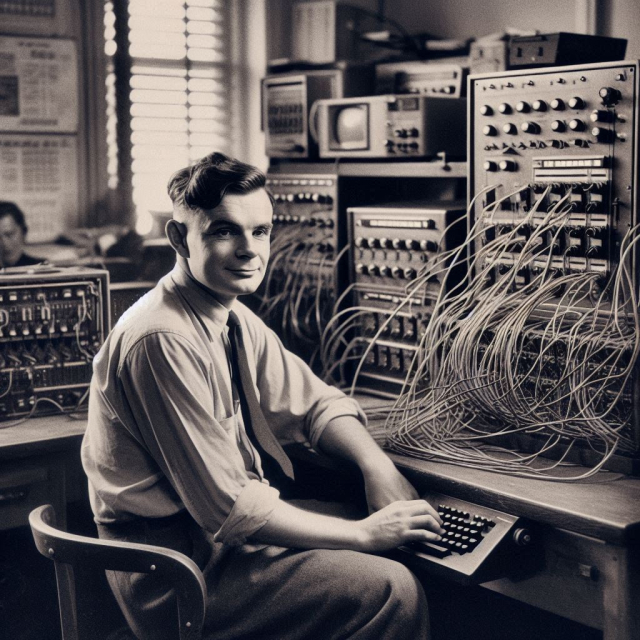Computers have revolutionized virtually every aspect of modern life. From their humble beginnings as calculating machines to the powerful devices they wield today, computers have transformed how we work, communicate, and entertain.
Origins of Computers.
The first devices that can be considered precursors to modern computers were mechanical calculating machines, such as the Pascaline invented by Blaise Pascal in 1642. However, the real breakthrough came with the development of Charles Babbage's analytical engine in the 19th century. Although never fully built during its lifetime, the analytical engine laid the theoretical foundation for future computer designs.
The Age of Electronic Computers.
The 20th century saw the creation of the first electronic computers. ENIAC (Electronic Numerical Integrator and Computer), built in 1945, is widely considered the first general-purpose electronic computer. It weighed around 30 tons and occupied 167 square meters, using approximately 18,000 vacuum tubes.
Throughout the 1950s and 1960s, computers became more compact and powerful thanks to transistors and integrated circuits. This period marked the transition from tube to transistor-based computers, significantly reducing size and cost while increasing efficiency and reliability.
The Microcomputer Revolution.
The 1970s brought the microcomputer revolution. With the introduction of the Intel 4004 microprocessor in 1971, it became possible to integrate an entire central processing unit on a single chip. This allowed the development of personal computers (PCs) accessible to the average consumer. The Altair 8800, released in 1975, is often considered the first microcomputer, and its success inspired others such as Apple, Commodore, and IBM to develop their own lines of personal computers.
The Rise of Personal Computers.
The introduction of the IBM PC in 1981 was a turning point. The IBM PC established standards for hardware and software that facilitated compatibility between different manufacturers and software. This standardization fueled the mass adoption of personal computers in homes and offices.
Apple also played a crucial role in the evolution of personal computers with the launch of the Macintosh in 1984. The Macintosh popularized the graphical user interface (GUI), making computers more accessible and easier to use for people without advanced technical skills.
Laptops and Mobile Computers.
As technology continued to advance, computers became smaller and more portable. Early laptops were bulky and had limited capabilities compared to desktop models. However, in the 1990s and 2000s, laptops became lighter, more powerful, and more affordable.
The arrival of smartphones and tablets in the 2000s marked the next big leap in personal computing. These devices not only enabled computing on the go, but also integrated communication, entertainment, and productivity capabilities into a single compact device.
The Era of Cloud Computing.
In the last decade, cloud computing has changed the landscape again. Computers are no longer limited by their local hardware; Instead, they can access a vast amount of resources and services through the Internet. Companies like Amazon (with AWS), Microsoft (with Azure), and Google (with Google Cloud) have led the way in the development and adoption of cloud computing.
Impact of Computers on Society.
The impact of computers on society is profound and multifaceted. In the workplace, they have automated processes, increased efficiency, and opened new job opportunities in fields such as programming, graphic design, and systems administration. In education, computers have facilitated access to educational information and resources, transforming the way students learn and teachers teach.
In medicine, computers have enabled significant advances in diagnoses, treatments and research. Medical imaging, electronic health records, and simulation tools have improved the accuracy and efficiency of healthcare.
Computers have also transformed the way we communicate and socialize. Platforms such as email, social networks, and instant messaging applications have changed the dynamics of personal and professional relationships, allowing almost instantaneous communication on a global level.
Challenges and Ethical Considerations.
Despite its benefits, the widespread use of computers raises challenges and ethical questions. Data privacy and security are important concerns, as computers and networks can be vulnerable to cyber attacks. Additionally, automation and artificial intelligence, enabled by computers, raise questions about the future of work and the potential obsolescence of certain job roles.
The digital divide is also a significant problem, as not all people have equal access to technology. This can exacerbate social and economic inequalities.
Future of Computers.
The future of computers promises to be equally transformative. Emerging technologies such as quantum computing, artificial intelligence and the Internet of Things (IoT) are on track to further change the way we interact with the digital world.
Quantum computing, for example, has the potential to solve complex problems that are beyond the capabilities of classical computers. This could lead to advances in fields such as cryptography, artificial intelligence and molecular simulation.
Artificial intelligence, for its part, is increasingly integrated into our daily lives, from virtual assistants like Siri and Alexa to algorithms that drive content recommendations on streaming and social media platforms. As AI continues to evolve, its ability to perform complex tasks and make autonomous decisions will increase, posing both opportunities and ethical and practical challenges.
The IoT is creating a world where devices are interconnected and can communicate with each other to optimize efficiency and convenience. From smart homes that automatically adjust temperature and lighting to smart cities that manage traffic and energy more efficiently, IoT is transforming how we live and work.
Computers have come a long way from their beginnings as simple calculating machines. They have evolved to become essential tools that power virtually every aspect of modern life. As technology continues to advance, computers will continue to play a crucial role in the way we interact with the world, posing new opportunities and challenges that society will need to address. The ability to adapt and take advantage of these technologies will be key to facing the future successfully and responsibly.
